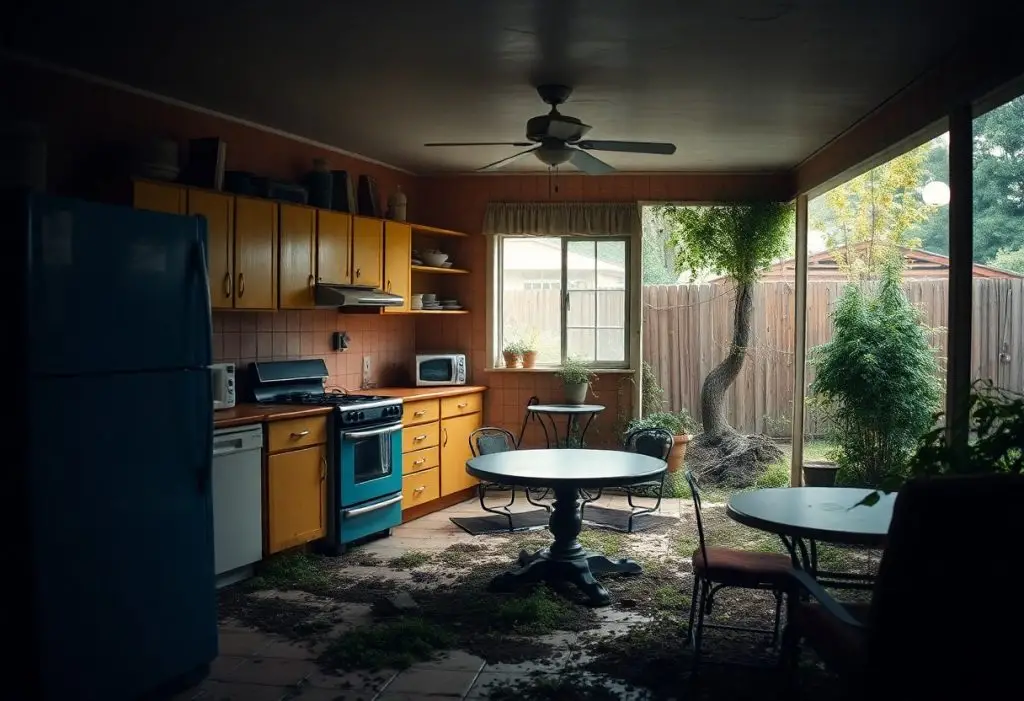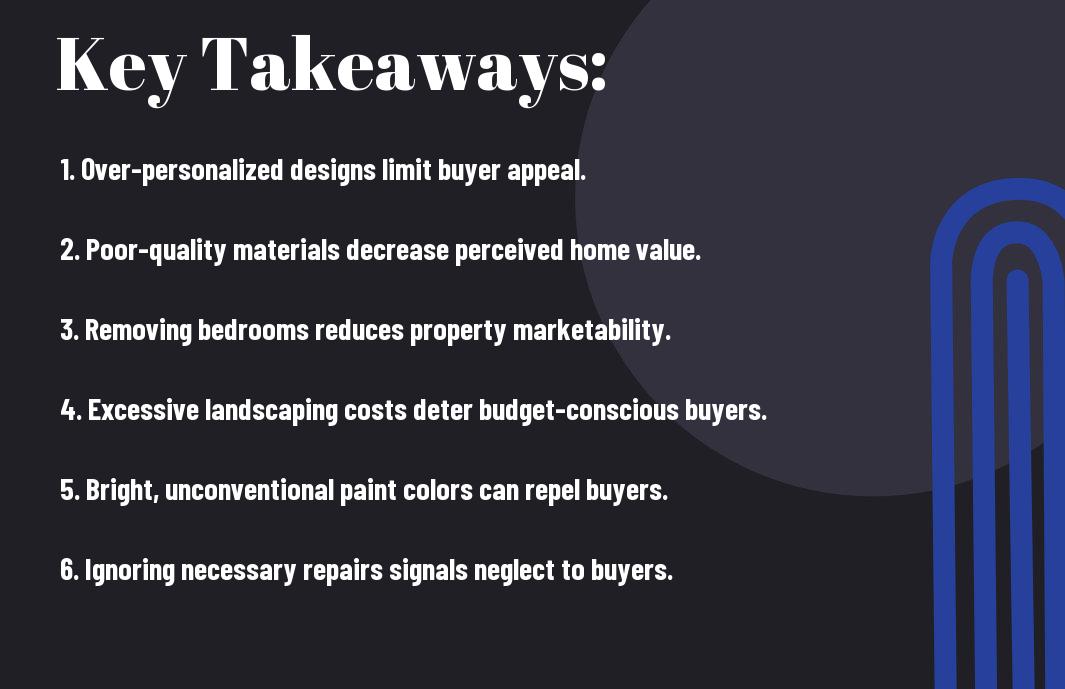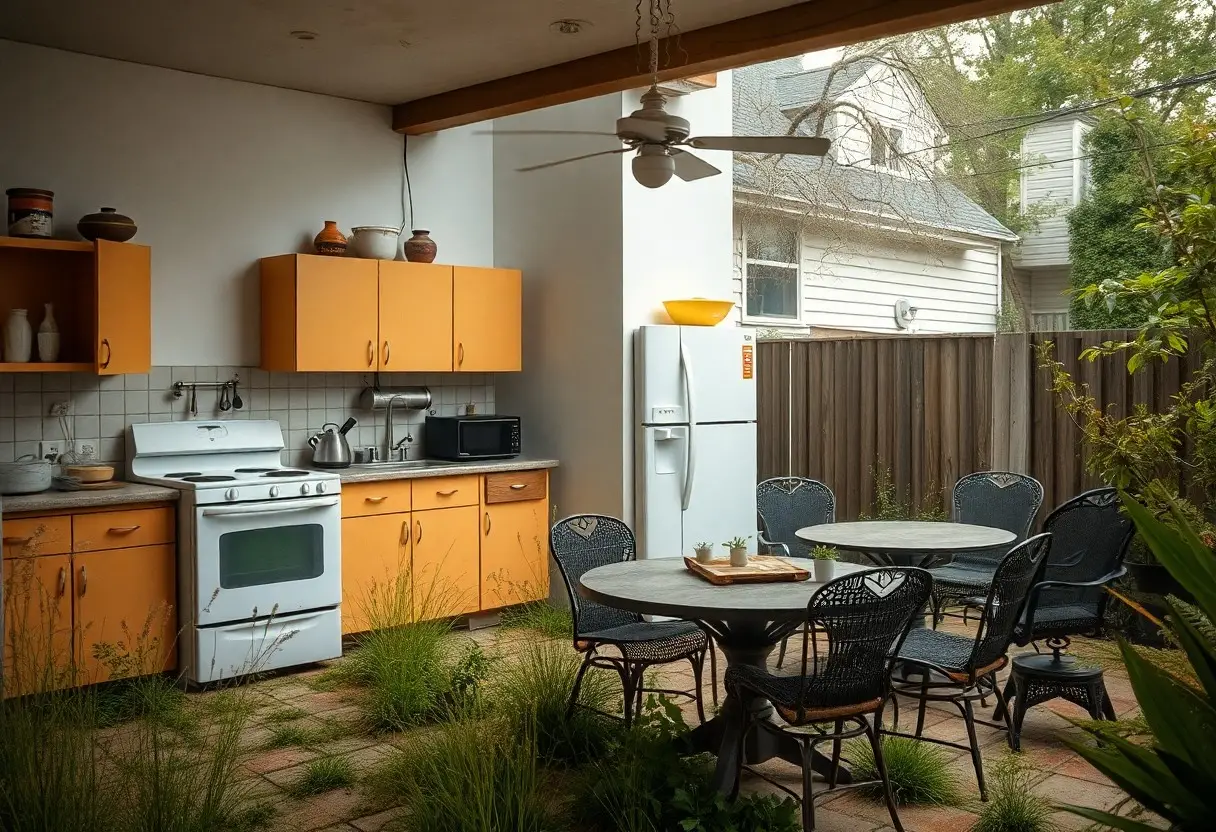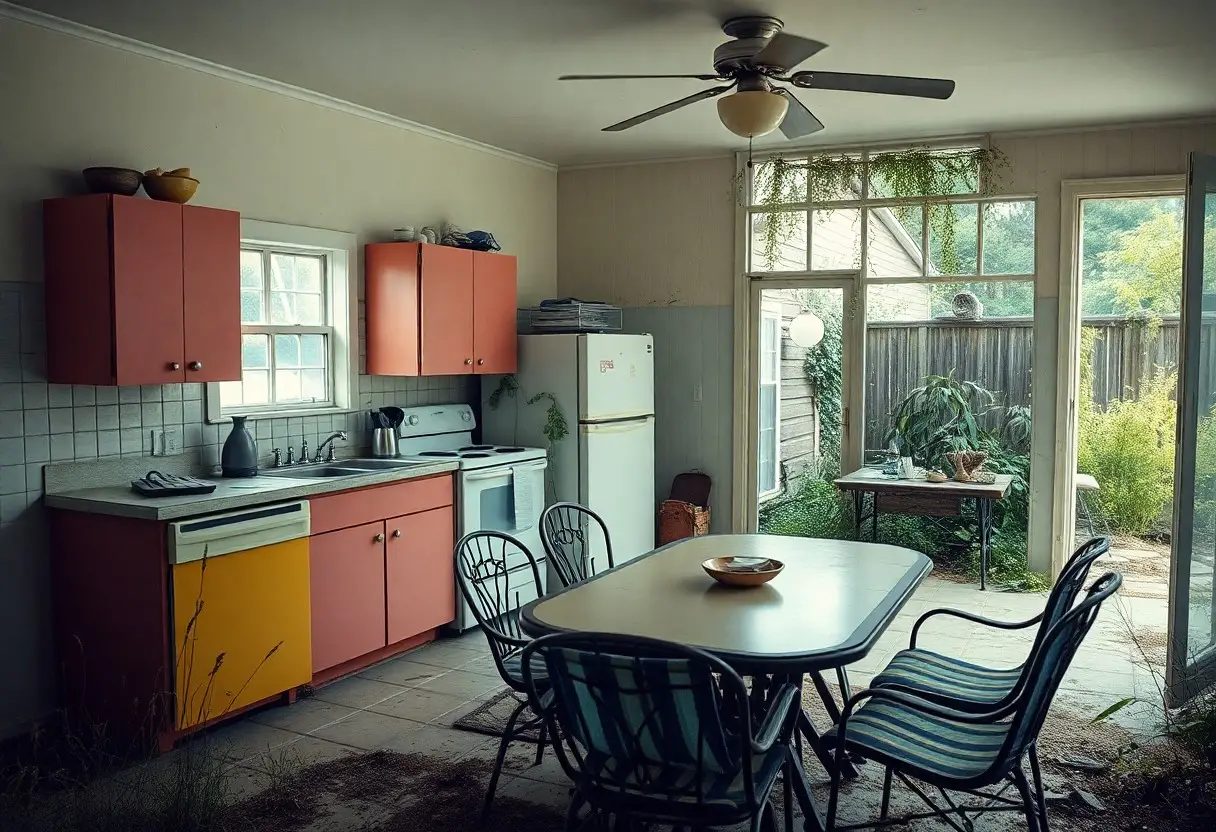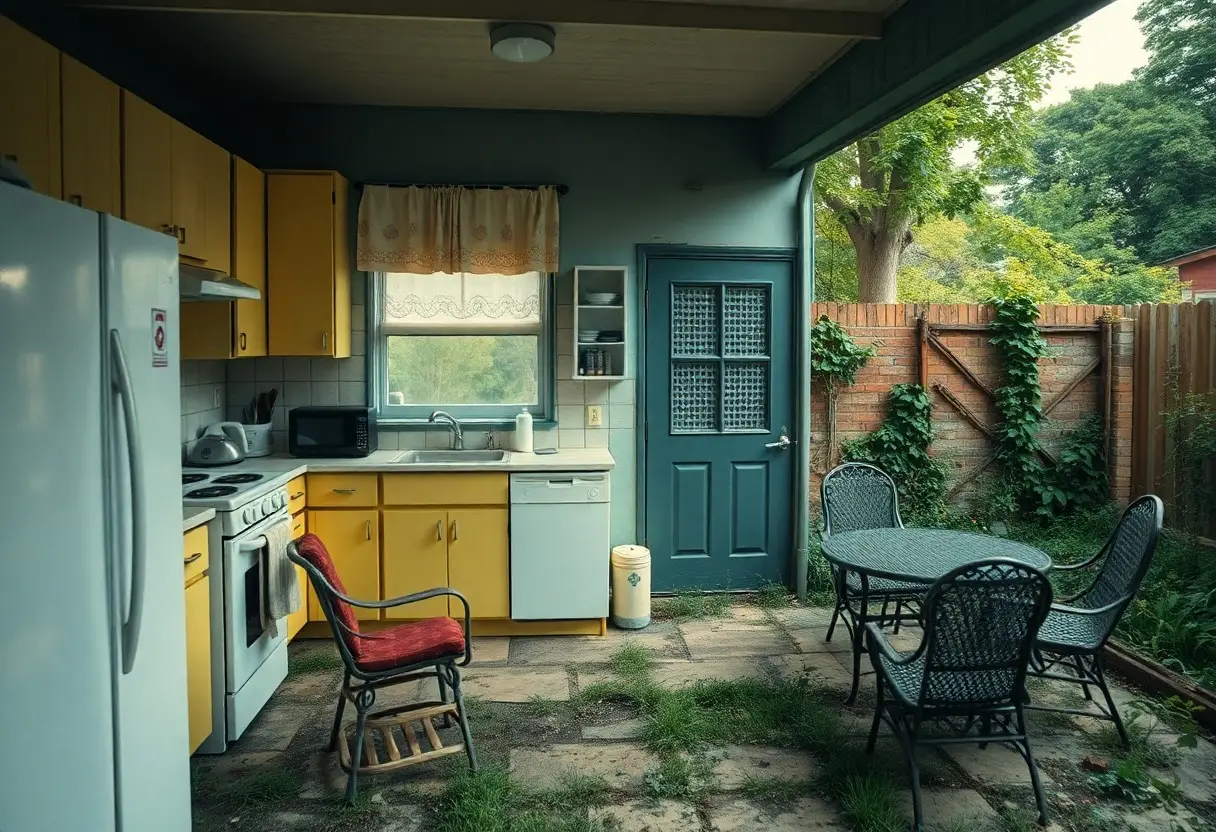You may think that certain renovations will enhance your home’s appeal, but some can actually detract from its resale value. Understanding which upgrades can negatively impact your investment is necessary for making informed decisions. Whether you’re planning a significant remodel or minor updates, it’s vital to choose enhancements that align with market trends and buyer expectations. In this post, you’ll discover common renovations that might hurt your home’s resale potential, helping you avoid costly mistakes and ensuring your property remains attractive to future buyers.
Common Renovations That Detract Value
While some renovations may seem like a good investment, they can actually detract from your home’s resale value. Updating your space without considering its impact on potential buyers can lead to disastrous results. It’s important to understand which common renovations may not provide the ROI you expect and could even harm your home’s appeal in a competitive market.
Overly Personalized Spaces
Overly personalized spaces can alienate potential buyers, as they may struggle to envision themselves living in your uniquely styled home. Custom paint colors, elaborate designs, or unconventional layouts might reflect your taste but can deter buyers who prefer a neutral, more universally appealing aesthetic.
High-End Upgrades in Low-End Neighborhoods
After investing in high-end upgrades in a low-end neighborhood, you may find that these improvements do not yield a proportional increase in your home’s value. Buyers often expect homes in less affluent areas to match the local market, making it difficult to recoup your investment.
Upgrades that exceed the neighborhood’s standard can result in diminished returns; potential buyers will compare your home to others in the area and may not be willing to pay a premium for your high-end features. Investing heavily in upscale finishes or luxury amenities might leave you with a beautifully remodeled home that doesn’t align with neighborhood pricing, ultimately limiting your market to only a small pool of buyers willing to overlook those discrepancies.
Kitchen Renovations That Can Backfire
Some kitchen renovations can hurt your home’s resale value if you’re not careful about your choices. While it’s great to update your space, certain upgrades may lead to potential buyers shying away. Knowing what renovations can backfire will help you make more informed decisions that appeal to a wider audience.
Excessive Customizations
Excessive customizations in your kitchen can alienate potential buyers who may have different tastes or needs. Unique layouts, extravagant materials, or specialized appliances might appeal to you, but they can create challenges for others who want a functional space that meets their preferences.
Choosing Trendy Designs Over Classic
Choosing trendy designs over classic styles can be a misstep for your kitchen renovation. While you may enjoy the latest trends in colors or materials, they can quickly go out of style, leaving your kitchen looking dated when it comes time to sell.
Indeed, opting for classic styles offers a timeless appeal that attracts a broader range of buyers. Elements like neutral color palettes, traditional cabinetry, and durable materials tend to have lasting value. Such choices resonate well with buyers looking for a home they can envision themselves in for years to come, ensuring your renovations don’t become a liability in the resale process.
Bathroom Upgrades That May Cost You
To enhance your bathroom, you might be tempted to invest in luxurious fixtures and premium materials. However, keep in mind that these upgrades may not resonate with potential buyers who prioritize functionality over extravagance. Investing excessively in high-end features might not yield a return when you decide to sell your home, making it vital to strike a balance between aesthetics and value.
Luxurious Features Not Valued by Buyers
Any lavish features, like heated floors or high-end stone countertops, may appeal to you, but they generally do not add the expected resale value. Many buyers are more focused on practicality, so these expensive upgrades could leave you disappointed when it comes time to sell.
DIY Attempts That Compromise Quality
Buyers are often wary of homes that show signs of DIY repairs or renovations, as these can lead to questions about the quality of work done. A DIY project that looks unprofessional can detract significantly from your home’s appeal.
And if you took on bathroom upgrades yourself, the workmanship might not meet the expectations of potential buyers. Poor installations or finishes can result in costly repairs down the line, making your home less attractive. It’s often better to hire professionals for renovations to ensure high quality and to provide peace of mind to buyers. A well-done renovation can help you recoup your investment when selling.
Outdoor Renovations That Could Hurt Value
Once again, when renovating your outdoor spaces, it’s vital to keep resale value in mind. Some enhancements can deter potential buyers, especially if they are highly personalized or geared towards a niche market. You want your outdoor improvements to resonate with the broader audience while also complementing the neighborhood’s character. Understanding the balance between beautification and maintainability can greatly affect your home’s appeal when it comes time to sell.
Over-Developed Landscaping
Could you be overdoing it with elaborate landscaping designs? While a well-manicured yard can seem appealing, overly complex or high-maintenance features can turn buyers away. Many purchasers prefer simple, easy-to-care-for spaces that allow for personal touches rather than intricate layouts that require constant upkeep.
Inconsistent Aesthetics with Neighborhood
Outdoor improvements must integrate seamlessly with your neighborhood’s overall design aesthetic. If your property stands out too much or deviates significantly from the prevailing style, it can detract from its attractiveness. A mismatched exterior can signal to potential buyers that they’ll need to invest in additional renovations to bring the home in line with local trends, which could be a deterrent during the selling process.
Plus, when making outdoor renovations, consider the existing architectural style of homes in your area. If you install features like bold modern landscaping in a neighborhood dominated by traditional designs, you risk alienating prospective buyers. They might see your home as out of sync with the neighborhood, leading them to question its suitability. By choosing improvements that harmonize with your surroundings, your home will maintain its marketability and resonate positively with potential buyers.
The Impact of Unpermitted Renovations
Your home’s value can significantly drop due to unpermitted renovations. When buyers discover that alterations were made without proper permits, they may view your home as a liability. This not only raises concerns about safety and compliance with local building codes but can also lead to costly fines. Additionally, when it’s time to sell, you may face difficulties with inspections or appraisals, as potential buyers shy away from properties that lack official approvals. It’s vital to ensure all renovations are permitted to protect your investment and maintain your home’s value.
Timing Your Renovations: When Not to Renovate
For effective renovation planning, it’s imperative to consider the timing of your updates. Avoid taking on major renovations during slow market periods, as this can limit your return on investment. Additionally, if your home is expected to be listed soon, it might be wise to hold off on extensive projects that could disrupt the market appeal. Focus on renovations that add value without over-improving, and keep an eye on local market trends to ensure your timing aligns with favorable conditions for selling your property.
To wrap up
Ultimately, understanding the potential pitfalls of home renovations can save you from making costly mistakes that could negatively impact your resale value. By avoiding overly personalized upgrades, extravagant additions, or neglecting vital repairs, you can maintain the appeal of your property for future buyers. Consider focusing on timeless improvements and keeping your market in mind before stepping into any projects. This strategic approach ensures that your home remains attractive in the competitive real estate market.

